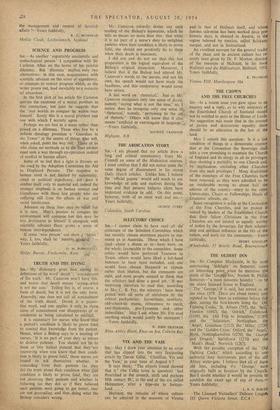TRUTH AND THE DYING SIR,—My dictionary gives first among its
definitions of the word deceit ' ' concealment of truth.' Mr. Cameron won't have this, and insists that deceit means saying–what is not the case.' Telling lies is, of course, a
form of deceit, but it is not the only form. Assuredly, one does not call all concealment of the truth deceit. Deceit is a pejora- tiye word, and one applies it only, to those cases of concealment one disapproves of or condemns as being calculated to mislead.
It is customary for nurses who knovithat a patient's condition is likely to prove fatal to conceal that knowledge from the patient. Hence, when a Bishop says to a meeting of nurses, It is no part of your duty as nurses to deceive patients. You should not lie to them or (my italics) pretend that they "are recovering when you know that their condi- tion is likely to prove fatal,' those nurses are bound to ask themselves whether, in concealing from their patients (as they do) the truth about their condition when tint condition is likely to prove fatal, they arc not deceiving their patients and whether in behaving (as they do) as if they believed such patients were going to get better, they are not pretending. and thus doing what the Bishop considers wrong.
Mr. Cameron robustly denies any -such reading of the Bishop's injunction, which he tells us means no more than this: that while it is no part of a nurse's duty to enlighten patients when their condition is likely to prove fatal, she should not positively lie to them when their death is imminent.
I did not and do not see that this last proposition is the logical equivalent of the Bishop's original injunction. Moreover, I believe that if the. Bishop had uttered Mr. Cameron's words to the nurses, and not his own, his speech would not have made the headlines, and this controversy would never have arisen.
A last word on ' rhetorical.' Just as Mr. Cameron recognises only one sense of deceit, namely ' saying what is not the case,' so, I notice, does he recognise only one sense of ' rhetorical,' namely, ' pertaining to the artf,,,, of rhetoric.' Others will know that it also means artificial or extravagant in language:, —Yours faithfully,


































 Previous page
Previous page